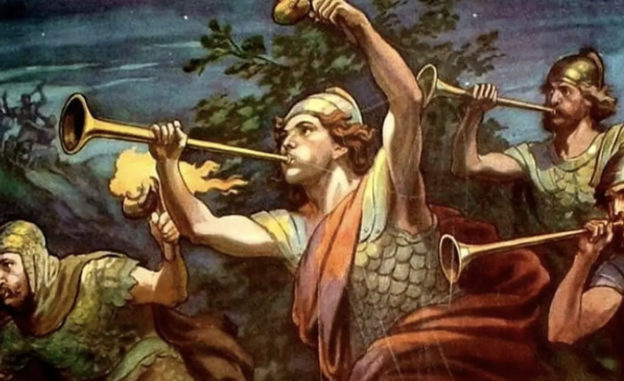Read Judges 8:22-32
I watched the All Blacks game on Saturday evening. The side seemed a shadow of the colossus which won back-to-back Rugby World Cups. The strength that the All Blacks had in 2015 was not apparent in July 2022; weakness instead.
It is hard to stay strong. Harder still when you were never particularly strong to begin with, and when those around you are weak. For all the strength of Gideon’s victories over Midian, empowered by God, his latter years are a story of weakness. Weakness in Gideon’s own behaviour, and weakness in the Israelite people he judged.
Firstly, we see weak leadership. After the stunning victories of Israel, led by Gideon, empowered by God, over Midian, the people came to Gideon and said “rule over us, you and your son and your grandson also, for you have saved us from the hand of Midian” (v.22). Having led the hosts of Israel in driving out the Midianite locusts, the people want Gideon and his sons (who they presume, must share the same blessed blood) to rule over them as king.
Gideon answered with the right words. “I will not rule over you, and my son will not rule over you; the LORD will rule over you” (v.23). Gideon dismissed the title of king for himself and his children, and correctly identified God as their Great King who they should look to for leadership.
Yet despite Gideon’s words, there is disagreement about whether he really meant them. While the words are good, there are troubling actions which reveal weak leadership.
Firstly, Gideon demanded (and received) tribute from the Israelites, from the bodies of the Midianites. Gideon requested the earrings the Midianites wore (v.24), which the Israelites willingly gave (v.25). The total was more than 18 kilograms of gold, besides all the booty liberated from the dead rulers of the Midian coalition (v.26).
Secondly, we later learn that Gideon acquired a sizable harem, by which he had 70 sons (v.30). One of those was named Abimelech, which means… “My Father is King” (v.31).
Perhaps Gideon did not adopt the title of king as such, but he certainly acted like one. Somewhat like “Lord Protector” Cromwell, who was not king of England and Scotland of course; he just acted a lot like one.
Secondly, Gideon’s weakness is shown in his religious innovation. In a sense, because of his status, this is also a failing of leadership. Gideon took the gold and other booty tributed or captured from Midian, and made an ephod with it (v.27). Okay, so what?
The ephod was part of the High Priest’s outfit, and lived with the Tabernacle. It stored the Urim and Thummim, by which God provided direction. Essentially, Gideon was claiming for himself high priestly privileges by making this ephod. After all, had not God spoken specially to him in calling him to lead Israel? Surely this special relationship must continue!
Sadly, this act created a snare for his family and an opportunity for idolatrous Israel, descending down the spiral of disobedience, to idolise something other than God (v.27).
Thirdly, Gideon’s rule marks the last period of rest, because his weak leadership and religious innovation only accelerate Israel’s decline. While Israel rested for 40 years after Gideon defeated Midian (v.28), this was the last time that the land would not suffer the perils of war or conflict.
Gideon (aka Jerubbaal) went home, lived the king-in-act-but-not-name life, had lots of wives and kids, and died at a ripe old age (vv.29-32). But trouble is coming. Gideon might not be king in name, but just wait until “My Father is King” gets his hands on the ephod.
Looking at this passage, we see an example of someone who achieved so much in God’s strength, and yet who still “let the side down.” Sadly, this is true of us all. We all fall short, because we all stumble and sin.
For many leaders of God’s People through the ages, this is equally true. We should not hide from the fact that many leaders have failings. We should not dismiss those failings, but nor dismiss the good done for God by them. After all, Gideon is listed in the “Faith Hall of Fame” in Hebrews 11 despite his questionable end.
Secondly, this passage warns us against religious innovation. Gideon led his people astray by his desire to still be seen as an instrument of continuing divine revelation.
In the same way, we can place emphasis on “God told me x” or supposed modern day prophets and less weight on God’s appointed means, the preaching of God’s Word, sacrament, and prayer. This is what one scholar calls a Quest for Illegitimate Religious Experience. Instead we should trust God to speak through the means he has appointed.
Thankfully, while Gideon and leaders let us down with flawed leadership and religious innovation, Jesus did not let us down. He alone lived his life perfectly to the end, and that perfect life cloaks ours by grace through faith. In his life, we have eternal rest.

